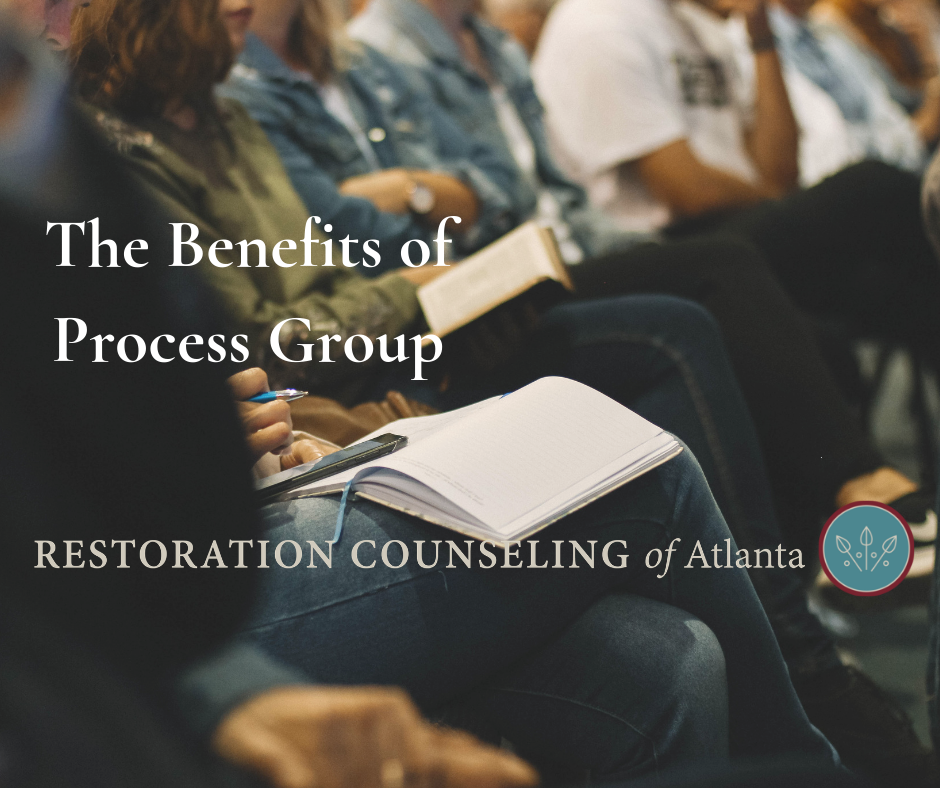“You did such a good job!” How well do you take a compliment? Do you allow it to sink in and nourish your soul? Or have you learned to say thank you because it’s kind? All the while, inside, you are rejecting those words or doubting their validity.
“I need to talk to you.” How do you respond to that dreaded moment your boss or spouse expresses the desire to sit down and chat? If you are like me, you’re immediately on edge. You’re nervous about what you did wrong, how you are in trouble, or in what ways are you not measuring up.
“Sure! Of course, I can help.” Have you ever found yourself muttering these words with forced excitement to the request being thrown your way? Even though, internally, you felt the pressure of over-commitment? In these moments, resentment builds, and you resolve to avoid the situation in any way possible in the future.
How good would it feel to navigate these and numerous other difficult situations with more finesse?
Enter a process group.
What comes to mind when I ask you to think about your experience with a group or team of people? A Sunday school class or small group? A group project? A team of coworkers or an athletic team? Or perhaps even your immediate or extended family all together for the holidays? Regardless of which scenario you resonated with most, we all have first-hand experience in a group of people. We can immediately remember Johnny who drove us crazy on our group project for not pulling his weight on the assignment. Or Nancy who never seemed to speak her mind in team meetings even though she had brilliant ideas. Or Jose who was deeply supportive in moments where you were uncertain.
We can often readily identify those people in a group who drove us crazy, but we may also be able to remember moments of deep appreciation that surfaces, such as a co-worker who took the time to encourage you after a hard interaction with a boss, or a teammate who picks you up when you failed to make the winning shot.
The Group Setting
You are likely to have a mixed bag of positive and negative group experiences similar to the examples mentioned above. As a result, most of us prefer to avoid group contexts or to stay on the surface within group settings to protect ourselves from the complexity and uncertainty of it all. While it is understandable to prefer to avoid such situations, it is exactly the type of environment that is most conducive to change. Furthermore, it encourages internal realities that we would prefer to keep at bay to surface. It’s precisely these realities that keep us stuck and hinder our ability to be the person we want to be.
Change is hard. It can be frustrating and embarrassing to acknowledge our shortcomings, even to ourselves. Additionally, receiving external feedback that we need to change in the areas we are already keenly aware of can be even harder. We typically enter into various endeavors to change with such honorable desires to grow, only to find out that often executing those shifts in the real world can be so much more difficult than we expected. Our preference would be to take the route of figuring it out alone rather than facing those limits in the presence of others. While trying to grow in isolation is understandable, the effectiveness of this approach is limited. It leaves parts of us under-developed and relationally deprived, resulting in unwanted thoughts, feelings, or behaviors.
Throughout our lives, we are wounded in relationships and creatively begin to find ways to hide who we truly are. This leaves us in a bit of a bind. We need each other to heal from these wounds and change the hiding patterns we have come to find safety within. Process group provides a solution to this bind. It does not fully remove the risk of change because change is always a bit unsettling. However, it does provide a safe context within which to grow.
The Benefits
The immersion in a community that provides safety, connection, and feedback is vital to living the abundant life God promised. Unfortunately, this can be deeply difficult to find or experience in our everyday lives. As a result, we desperately need an environment that allows us to experiment with allowing more of ourselves into relationships so we can grow and heal. Process group is one avenue to pursue this type of community.
Perhaps you are an individual feeling the pull to step more deeply into a community that will help you heal and grow. Maybe you are an organization that deeply desires to create that for your employees. Perhaps you’re a church who desires to find ways to create more safety within your small group ministries. Regardless of where you find yourself, if this idea resonates with you, I’d love to talk with you. I’d love to discuss how I can help you pursue experiencing this type of community for yourself or how to help you create this for those you serve.
 Written by: Becca Cline, LPC
Written by: Becca Cline, LPC
Roswell Location
becca@restorationcounselingatl.com, ext. 156
Becca has received extensive training with Dr. John Townsend, New York Times best selling author of Boundaries and has completed training in his Competence + Character growth model. She is currently completing the Townsend Leadership Program, which focuses on achieving strategic goals to pursue improved performance personally and professionally.
Becca works with male and female clients who are 13 years or older. She sees couples, families, and individuals. She has worked with clients dealing with a variety of issues including depression, anxiety, addiction, grief/loss, trauma, abuse, spiritual issues, sexuality, family of origin issues, codependency, anger, and interpersonal and relationship issues. In addition, Becca also has experience in running process groups.

